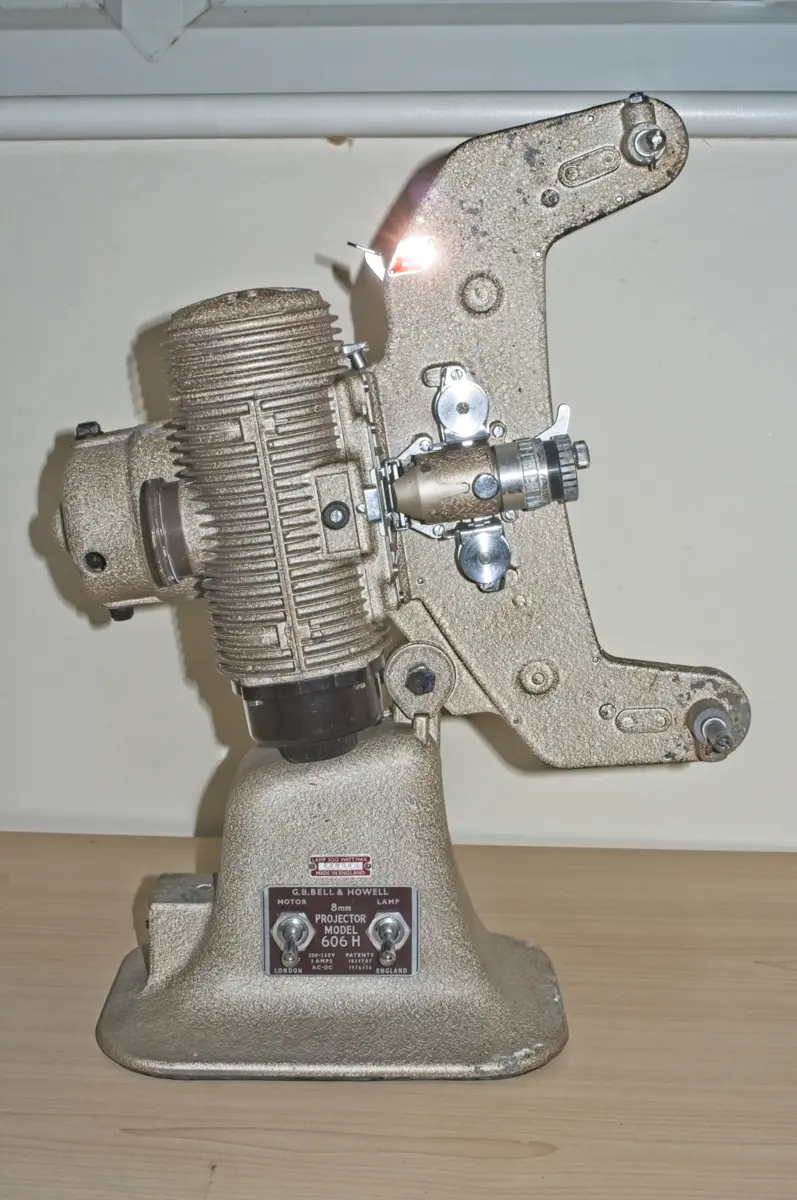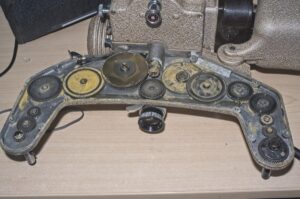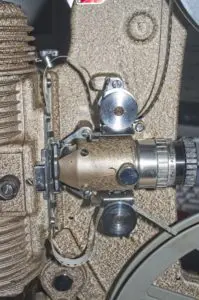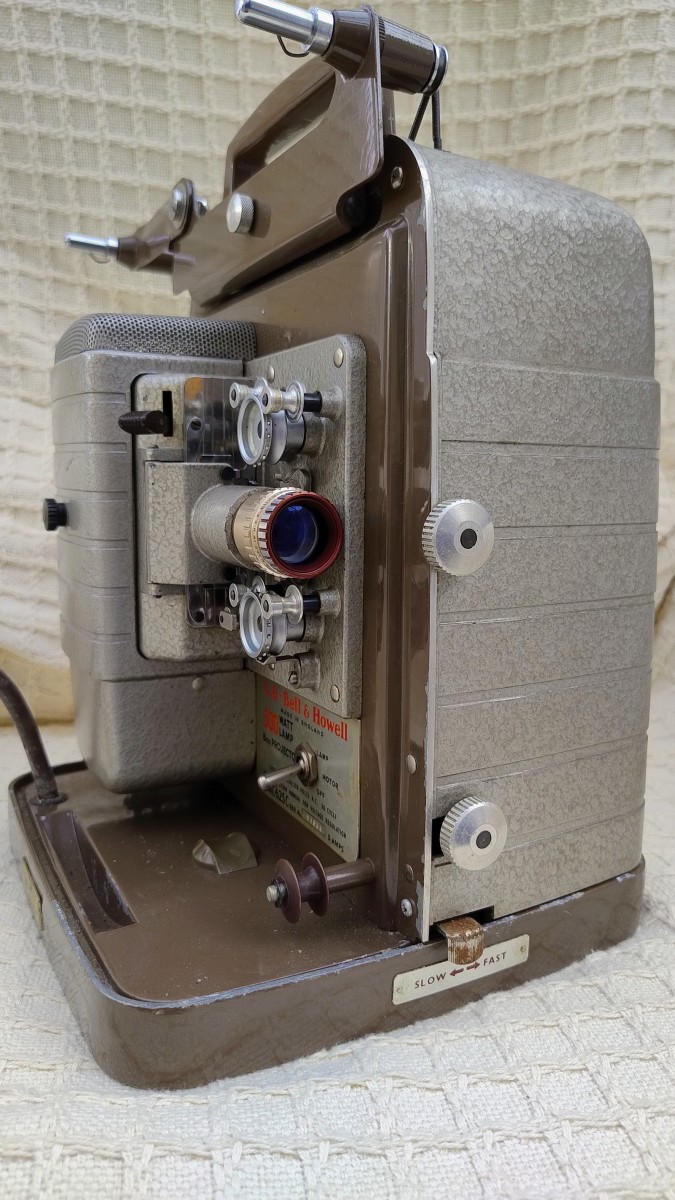Fantastic Vintage Bell and Howell 8mm projector model 606H
This post features probably the most classically vintage looking projector in my collection, the fantastic vintage Bell and Howell 8mm projector, model 606H. It is a simple machine with manual threading, a 500 W mains voltage lamp and a 15 – 20 mm zoom lens, which was made in the early 1950s.
Pictures of the Vintage Bell and Howell 8mm projector
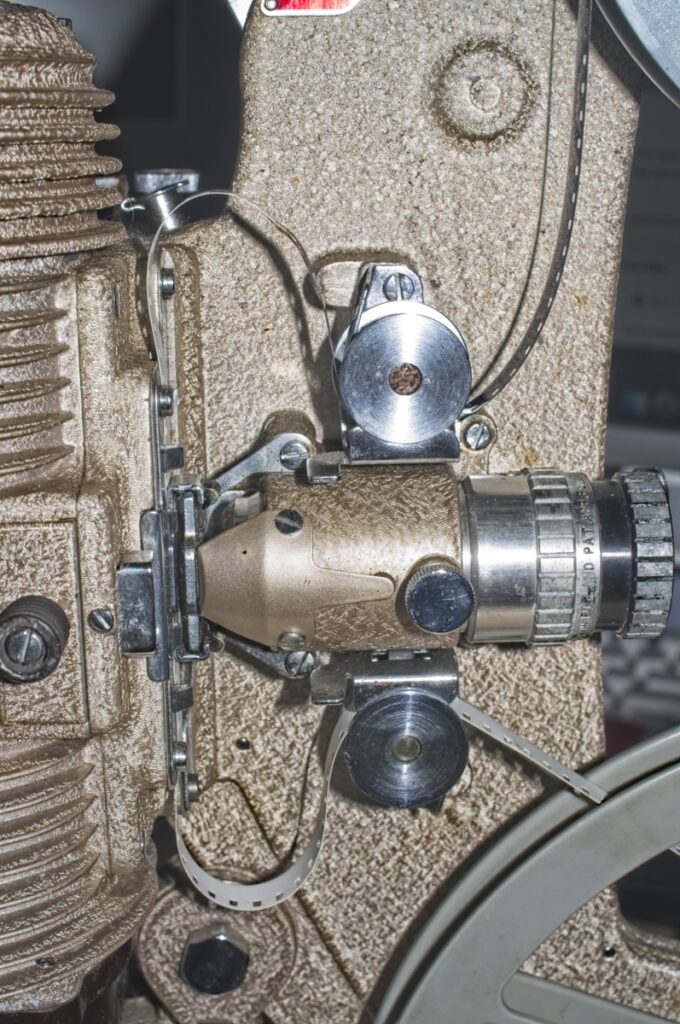
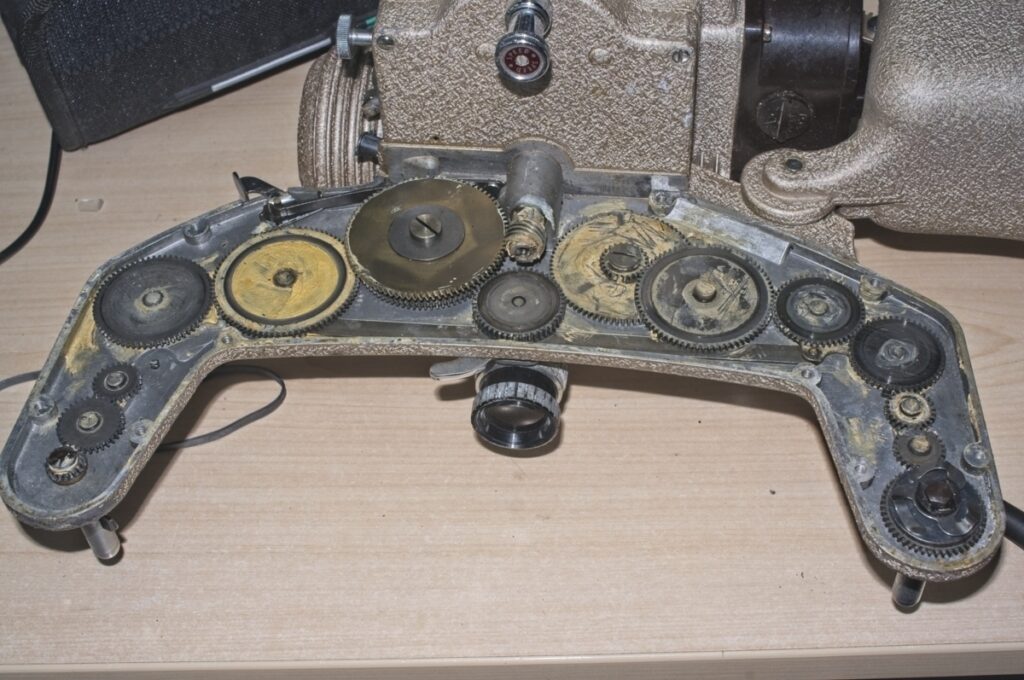
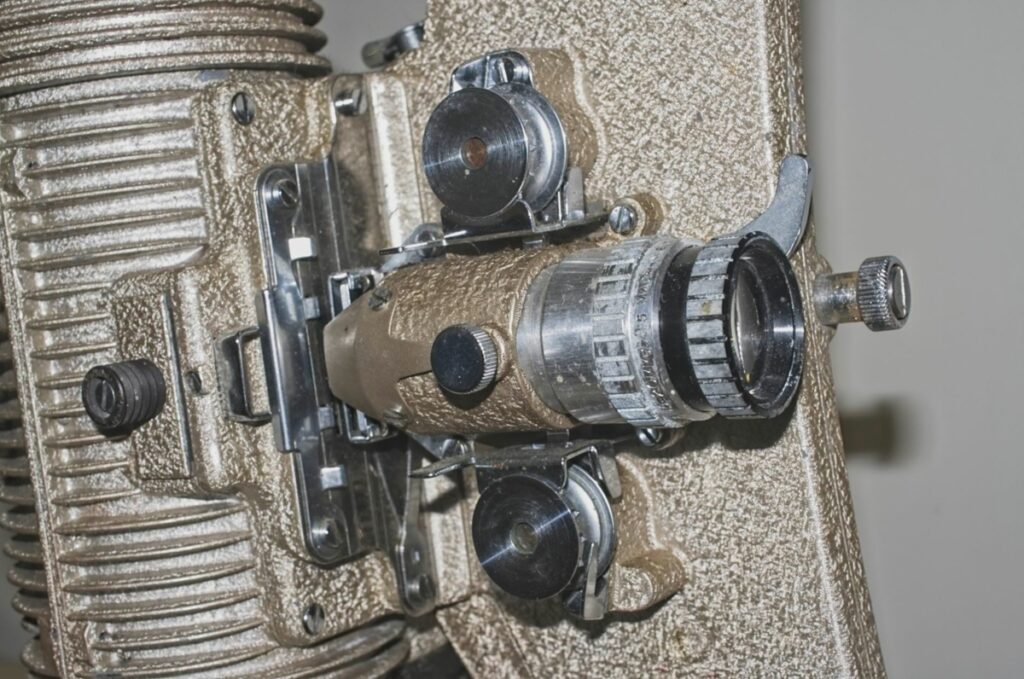
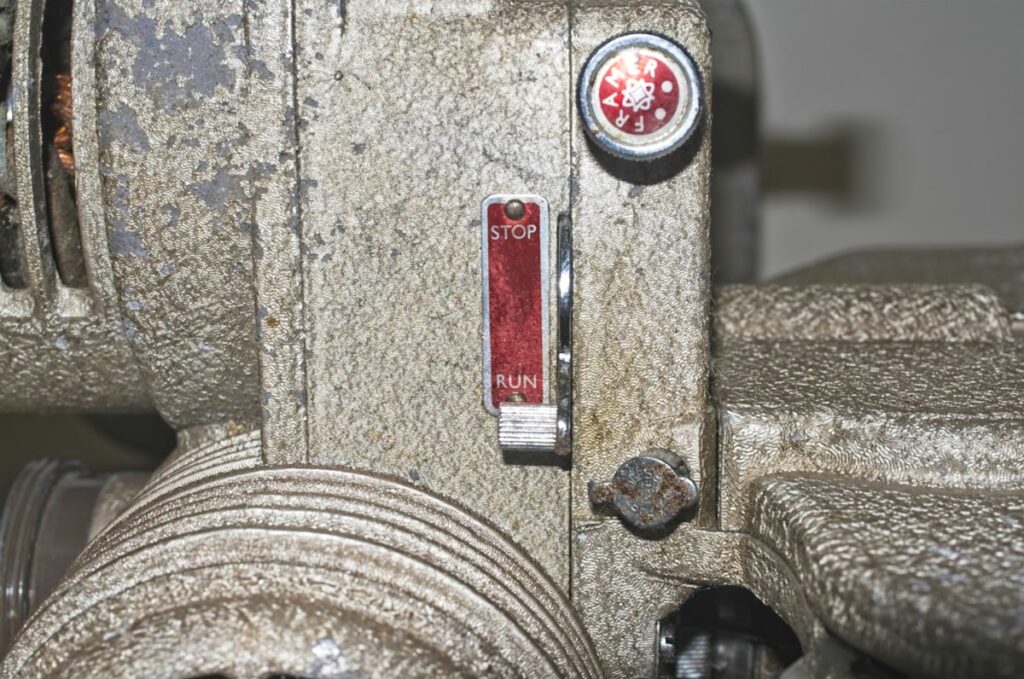
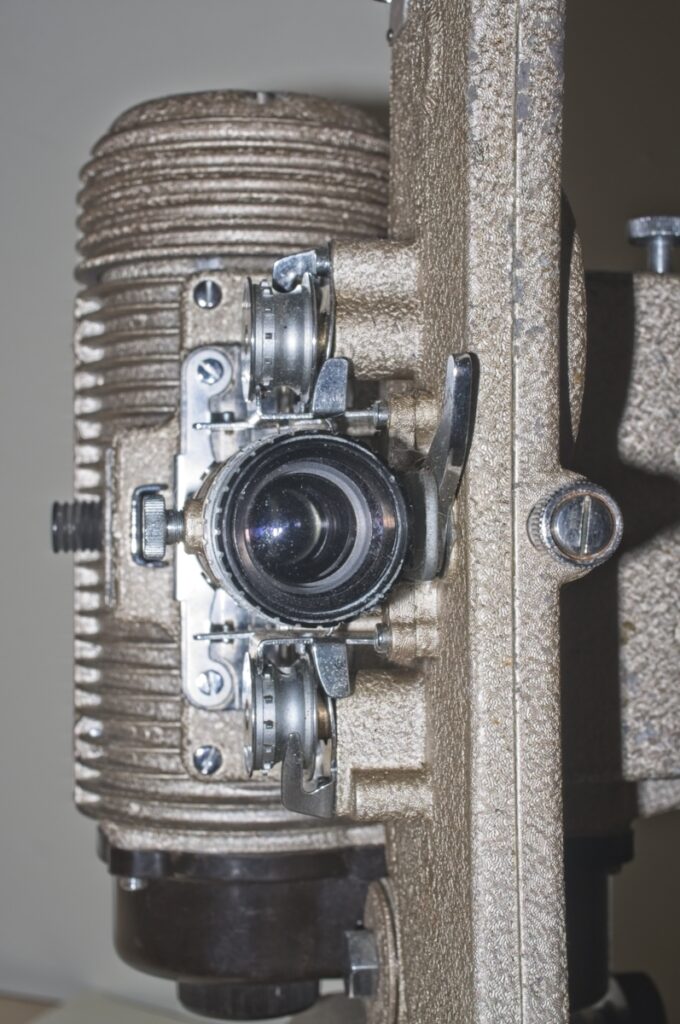
My vintage Bell and Howell 8mm projector model 606H
I paid £19.99 to buy this vintage Bell and Howell 8mm projector in an auction on eBay.
It was sold as working, although when I received the unit there was no power lead, so I couldn’t check that claim. In common with many projectors of this vintage, the unit has a power connector which seems to be completely unique to this model, so without the correct lead it can’t be powered up. In this case the seller was very good however, and when I contacted him he quickly responded, apologized, and sent the lead by the next post.
Once I had the lead, I could confirm that the motor and lamp were working, but the actual projector would not pull film through the gate because the bottom take up spool spindle was locked solid. When I looked at the spindle I found there is an oil point below it however, and by holding the projector upside down I could drop a bit of light oil in the oil point and around the base of the spindle. Following some gentle persuasion with a pair of pliers I managed to get the spindle moving and after a few minutes working it back and forth the spindle moved freely again.
Once I’d done this, I found that the projector motor could turn the take-up spindle when the projector was powered up.
The motor made quite a lot of noise when the unit was running, but again, once I’d applied some oil to the oil point at the top of the motor the noise levels dropped. Later, after I’d removed the back of the film arms, I found a lot of old, sticky, yellow grease clogging up the cogs, so I took a few minutes to clean that off with some cotton buds soaked in IPA, and after I’d applied some modern replacement grease I found the projector quietened some more.
Cosmetically, the paintwork has suffered a few knocks and bangs over the nearly 70 years of its life, although no more than would be expected, but all the levers which control the operation of the projector and the film path seem to be working well.
Vintage Bell and Howell 8mm Projector Description
As I said in the introduction, in my view, the vintage Bell and Howell 8mm projector model 606 H looks like a vintage projector is meant to look.
There are two solid arms to take the film reels, a pair of drive sprockets top and bottom and a film gate set in front of the lamp housing which holds a 500 W, mains voltage lamp.
The drive for the film transport is not transmitted with flexible, replaceable drive belts as with many other projectors, but by way of a set of cogs held within the solid arms. This is unique within my small projector collection, but I suspect as long as the cogs are kept lubricated it should be a reliable mechanism.
The actual drive is shown on the left with the top casing removed, and this picture shows the condition of the old oil and grease in the machine when I first took it apart.
The cogs actually run on spindles cast into the casing, with the cogs held in place by circular casting which sit just inside the teeth of the cog.
Running the vintage Bell & Howell 8mm projector model 606 H
The operation of the projector is really simple.
The reel of film to be shown is placed on the top spindle and the film is threaded onto the first sprocket wheel. There is a clamp which keeps the film in place, and this is lowered to allow the film to be correctly positioned. Then a loop is formed before the film is fed down through the gate. The gate is opened with a small lever sitting behind the lens.
After the film emerges from the gate at the bottom, another loop is formed and the film passed through the lower sprocket, using another clamp in exactly the same way the clamp on the top sprocket was used. Finally, the film is passed into the take-up spool for collection.
For anyone not aware, the loops are not just to make the film look neat. The projector works by pulling an individual frame into place in front of the lamp and holding it there while the image is projected. The loops are used to make sure there is enough film available for this to happen and if they are missing the projector will rip the film as it tries to position the frame being projected.
With the film correctly threaded, the motor is turned on, and the film transmission engaged with a lever on the top of the projector body. This starts the film moving, and at the appropriate time the lamp can be turned on, the lens focused, and the image size set with the lens zoom.
If, while the film is being shown, the motor is turned off for any reason, the lamp also turns off to avoid the film being burnt.
Rewinding the film
Once the film has finished, there is an option to set the machine to rewind by pulling the lever on the top arm from the Run position to the Rewind position. If this is done at the end of the film, before it has fully wound through the projector, the sprocket wheels reverse their direction and the top reel starts to pull the film back through the projector.
In this mode, the film will be played backwards. Interestingly, although the lever can be moved from Run to Rewind when the film is threaded in the gate, once the gate lever has been raised to open the film path, it won’t properly shut with the drive set to rewind.
When it comes to rewinding, rather than the method detailed above, it is faster to let the film completely run through the projector in normal play mode and then thread the film straight from the bottom reel to the top. When set like this the projector very rapidly returns the film to its original reel – in fact it is about the fastest rewind on any projector I own.
Other Features and specifications
The vintage Bell and Howell 8mm projector model 606 H has a small, extractable lens between the lamp and the film gate, which I assume is a condenser lens to focus the light onto the film. It may also serve as a heat filter.
On the back of the unit at the top of the base is a knob which adjusts the angle the projector body sits in relation to the base. This is to get the projected image to correctly fill the screen.
There are a few adjustment controls at various points around the projector:
- On the main transmission arm there is a manual drive control which can be pushed in and adjusted to wind the film transport
- On the top of the motor casing, there is a framing control
- On the front of the motor casing is a speed control.
Bell & Howell 606 H Specifications
- Vintage Bell and Howell 8mm projector model 606H
- Mechanically driven film transport – no belts to be replaced
- 500W 240V lamp type A1/47 (very expensive to replace)
- Bell & Howell Filmovara 15 – 20 mm f/1.5 zoom lens
- Auto light out when motor stopped
- Individual switch for motor and lamp
- Powered rewind (very fast)
- Framing and speed controls
- Motor brushes accessible for replacement
- Adjustable projection angle
- Serial No: 160886
Projector Manual
I recently came across the manual for this projector and I’ve included it here for reference.
Discover more from Everything Vintage
Subscribe to get the latest posts sent to your email.

